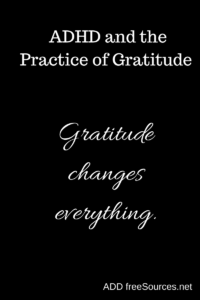“Gratefulness makes you fearless,” “It makes you trust life.”
– David Steindl-Rast
Most people have heard about practicing gratitude, and maybe even know that research has proven many benefits from making gratitude a habit in your life.
But, specifically, how is a practice of gratitude related to improving ADHD symptoms?
Gratitude improves sleep. Sleep improves executive function – for example, focus, planning, decision making, and regulating emotions. Improved executive functions enhance your performance which improves your mood and reduces anxiety and improves enjoyment. Enjoyment gives you more to be grateful for. And the cycle goes on…!!!
The neurochemistry of gratitude – you want some scientific evidence, don’t you?
Gratitude has a direct effect on depression symptoms (the more gratitude you feel, the less depressed you are) and an indirect effect on anxiety (more gratitude leads to improved sleep, which leads to lower anxiety).
Feeling grateful activates regions of the brain associated with the neurotransmitter dopamine. First of all, dopamine allows us to take charge of our attention – to shine a spotlight on the one thing we want to focus on – and ignore other competing demands on our attention.
Dopamine makes movements easier, so more dopamine in our brain allows us to be more fluid and efficient in our movements, including helping us to be more efficient thinkers.
Dopamine is the reward chemical, so when we get an extra dose of it, our brain takes note of where the dopamine came from and actively seeks out the same experience in the future. This makes it much easier to establish a habit! So once you start actively looking for things to be grateful for, your brain will encourage you to continue looking for things to be grateful for because the brain loves to get hits of dopamine.
Another powerful effect of gratitude is that it boosts another neurotransmitter, serotonin. Serotonin improves your overall mood, helping you feel more significant, powerful and self-confident!
Serotonin is also a key player in the ability to go to sleep. The buildup of serotonin throughout the day reaches a threshold and triggers the onset of sleep.
Serotonin is also a key player in the brain’s ability to focus and screen out irrelevant information. Like dopamine, serotonin helps your brain to “shine a spotlight” on what you want to pay attention to.
Surprisingly, it’s not even necessary for you to actually think of things you are grateful for – simply trying to think of things to feel grateful for triggers the release of serotonin! Wow!
Of course, if you actually find things to feel grateful for, that just increases the amount of serotonin in your brain.
And by the way – finding the things you are searching for (in this case, actually thinking of things you are grateful for) is a form of achievement which triggers the release of dopamine!
So the more things you acknowledge true gratitude for, the easier it will be to pay attention, focus and use your muscles smoothly! And you’ll be fighting off depression and improving sleep in the process!
Even though it’s easy to see how gratitude can lessen the symptoms of ADHD, it still can be hard to get into a “gratitude habit.”
So many of us are trained to notice what is broken, undone or lacking in our lives, aren’t we! We have to learn a new way of looking at things, a new habit. And that can take some time.
That’s why practicing gratitude makes so much sense. When we practice giving thanks for something, anything we are truly grateful for, instead of complaining about what we lack, we give ourselves the chance to see our life as an opportunity and a blessing.
There are many things to be grateful for: a favorite food, an exciting experience, someone who cares about us, the opportunity to choose. What’s on your list?
Some Ways to Practice Gratitude
- Keep a gratitude journal. You can make daily, weekly or monthly entries. Don’t force it – this will work better if you are truly interested in doing it.
- Make a gratitude collage by drawing or cutting out and pictures and adding words..
- Practice gratitude around the dinner table or make it part of your nighttime routine.
- Make a game of finding the hidden blessing in a challenging situation, or as Esther Hicks would say, “Reach for the better-feeling thought!”
- When you feel like complaining, make a gratitude list instead. You may be amazed by how much better you feel.
- Notice how gratitude is impacting your life. Write about it, sing about it, express thanks for gratitude.
Now that you have read all the way to the end of this article…
…think about ways to insert gratitude into your life so you can reap the benefits of improved mood, better attention, more restful sleep and greater control of everything in your life that is important to you!
About the author: Kari Miller, Ph.D, BCET is a board-certified educational therapist with a Ph.D. in educational psychology. She’s been educating and coaching adults and young people who have ADHD and learning disabilities for thirty years. She has compiled the very best research to create success programs for women ready to reclaim the power in their lives!
Kari is an expert at helping her clients strategically leverage their personal strengths into productive action! She is passionately committed to guiding women with ADHD as they take control of their lives by getting in touch with their real assets and overcoming the real reasons they get stuck. Kari Miller coaches women by phone or Skype anywhere in the world through private and group coaching programs.
Top: Photo courtesy of Canva – http://www.canva.com
Bottom: (Photo courtesy of David Costello/FreeDigitalPhoto.net) Modified on Canva http://www.canva.com



